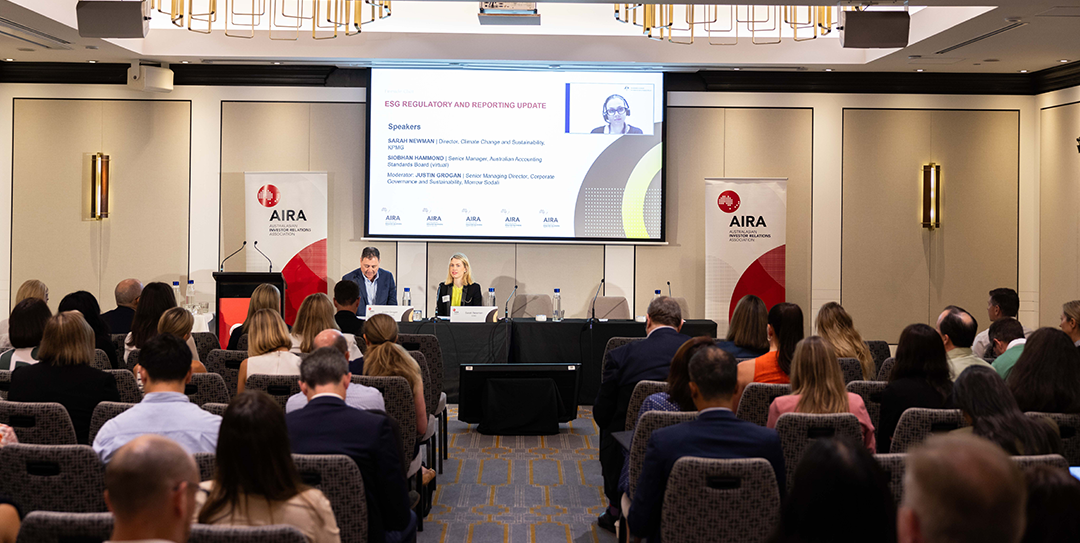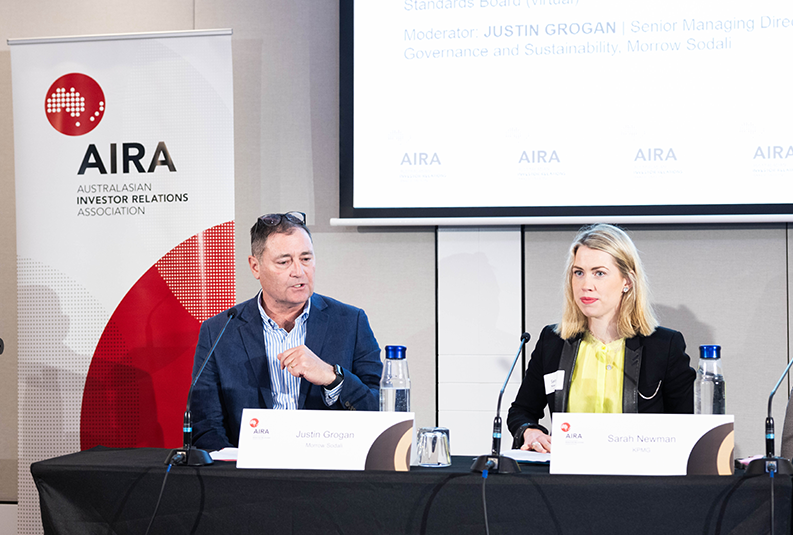
08 December 2023
A Closer Look at the 2023 Australasian IR Forum: Key Takeaways and Trends
The 2023 Australasian Investor Relations Forum, hosted by the Australian Investor Relations Association (AIRA) was a chance to meet and reconnect with fellow IR professionals and gather valuable insights on the current climate in which ASX companies are operating. Morrow Sodali was the Professional Development Partner and several of our team members from the Sydney Office had the opportunity to attend.
There were three key themes running through the conference:
1. The AI Revolution is here to stay. Get comfortable being uncomfortable. In a vibrant panel featuring Neil Waldron of Nasdaq, Anita Stanley of Macquarie Securities, Berowne Hlavaty of JP Morgan and moderated by Ross Moffat of Wisetech Global, the general sentiment was one of excitement about the opportunities offered by AI despite the need to keep an eye on its “hallucinations”. AI was likened to a new, youthful and inexperienced Associate: eager and helpful in churning through excesses of work but requiring regular supervision and redirection. It may be early days but there are clearly opportunities for AI to help get things done a lot faster (such as pulling key data from Annual Reports) and give time back for more strategic engagement. A favourite quote from the session was “AI Won’t Replace Humans – But Humans with AI will Replace Humans without AI” (originally Karim Lakhani, Harvard Business School Professor). The top cautionary tip when embracing this revolution was to pay attention to your contracts…Retail AI Licenses often allow the service provider to keep the data input into its interface whereas Enterprise licenses claim they will not keep the data. Caveat emptor.
2. When it comes to ESG, “By failing to prepare, you are preparing to fail” (Benjamin Franklin). In a highly informative panel moderated by our own Justin Grogan (Senior Managing Director, Corporate Governance & Sustainability APAC), we heard from representatives of those mandating the upcoming climate reporting requirements and those providing assurance over the reports (Siobhan Hammon of the Australian Accounting Standards Board and Sarah Newman of KPMG, respectively). The climate reporting and the further Sustainability reporting requirements in years to come are operating in a fast-moving space where the standards have a broad reach. It was noted that companies operating in several jurisdictions, especially in Europe and California, may be impacted by regulation before Australian laws come into effect. However, reporting shouldn’t be the end goal and finding the right collaborative system within individual companies is key to effective disclosure. As is setting up systems early to support the data gathering process. This session highlighted time and resource constraints within reporting companies and assurance providers and stressed the importance of education and preparedness around the requirements by all stakeholders.

A further focus on ESG through the day stressed the importance of the “S” component. Companies are increasingly being held accountable for their impact on the communities in which they operate, whether it is the affordability of their products in a rising inflationary environment (Insurance Provider IAG), their ability to go beyond simple ‘compliance’ requirements when working with the traditional owners of the land they are mining (IGO) or their accountability for their part in abolishing modern slavery (A2 Milk). Compliance with the minimum requirements is no longer seen as adequate and companies are now being more heavily scrutinised on whether they have acted in a ‘sustainable’ manner. How to measure these efforts is a question that remains unanswered but, in this area, the mantra has changed from “Buyer Beware” to “Sellers Care”.
3. The changing dynamics of the retail investor landscape was an apt way to round off the forum with an insightful panel discussion debunking some of the myths about retail shareholders. Rather than their skittish, volatile stereotypes, they are often long-term investors with an average holding period of approx 2 years. Frenzied retail investors such as those seen in the GameStop trading saga in 2021 are a small but loud crowd. Moreover, the younger cohort of shareholders are often diversified across a broad range of exposures compared to their older counterparts who tend to take single stock bets. Female investor participation rates have increased, and women are coming through in the numbers as savvy investors. Meanwhile cost of living pressures are putting a spotlight on fees and charges, while a heavier weighting is being placed on trust levels and authenticity as well as seamless platform use. Additionally, ESG achievements are highly valued and the power and influence of social media cannot be ignored. Effective communication with retail investors means understanding your audience and the platforms they are using – and providing sufficient opportunities for direct company engagement throughout the year, not limited to the Annual General Meeting.